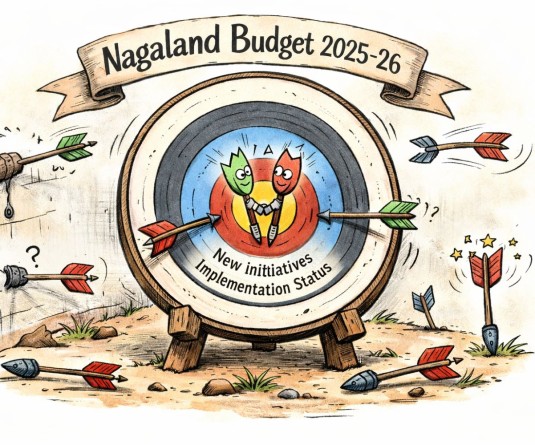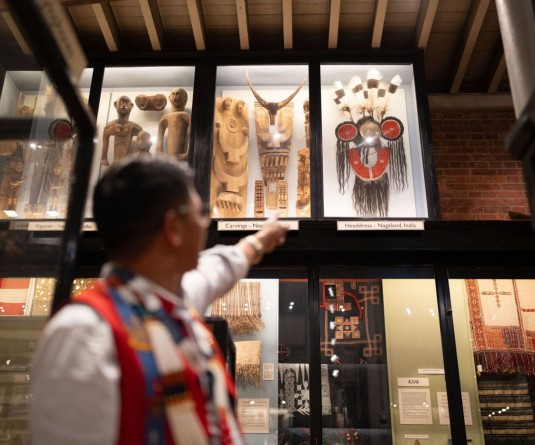Limabenla Jamir delivers a lecture on “Governance, Growth and People: Who Shapes Mokokchung’s Development Agenda?” (Morung Photo)

A policy analyst explores governance, growth and people at the First Rain's Masterclass Lecture Series
Yarden Jamir
Mokokchung | March 29
Governance and economic growth are often viewed through the lens of policymakers and government officials, but who truly shapes a town’s development agenda? This question took center stage at the First Rain's Masterclass Lecture Series 03 on Friday evening, where Limabenla Jamir, a policy analyst focused on inclusive participatory governance and international development, with a particular emphasis on fragile states, delivered a lecture on “Governance, Growth and People: Who Shapes Mokokchung’s Development Agenda?”
Jamir, who holds a Master’s degree in International Development Policy from Duke University, has previously worked with the World Bank’s Public Sector Governance and Service Delivery unit, focusing on digital development and local governance. She currently serves as the Asia Coordinator for the Local Public Sector Alliance (US).
Rethinking Development
Jamir began by questioning the conventional understanding of development, arguing that it is too often equated with infrastructure projects and economic expansion. “Development should focus on human capital, governance capacity, and social well-being—not just physical infrastructure and budget allocations,” she asserted.
She stressed the need for a people-centric approach that prioritizes social well-being alongside economic growth.
Jamir also examined the role of political elites in shaping development agendas, stating that policy decisions are often dictated by those in power, who may not always have the best interests of the people at heart. She pointed out that development projects in Mokokchung have frequently reflected political considerations rather than genuine community needs, leading to disproportionate resource allocation and economic disparities.
Who are the Key Players?
Jamir emphasised that governance plays a crucial role in shaping economic and social progress. While government bodies set policies, their effectiveness depends on how well they incorporate public needs and aspirations. “Good governance is not just about making decisions at the top—it’s about how those decisions are implemented and whether they reflect the voices of the people,” she said.
The discussion centered on identifying the primary actors influencing Mokokchung’s development, including government institutions, the private sector, civil society, and the people themselves. Local and state-level authorities shape policies on infrastructure, education, healthcare, and public services, while businesses, entrepreneurs, and NGOs contribute to economic growth and social development.
At the heart of development, however, lie community participation, civic engagement, and grassroots movements that play a vital role in shaping policies and holding authorities accountable.
Jamir stressed that while government policies and economic investments are important, true development is most effective when it is participatory and community-driven.
Economic Realities: Dependency vs Self-Sufficiency
Addressing economic structures, Jamir observed that Mokokchung’s economy is heavily dependent on government employment and external funding. “Sustainable economic growth in Mokokchung requires diversification and community-led enterprises beyond government employment,” she noted.
She called for economic diversification beyond government jobs, advocating for supporting local entrepreneurs, agriculture, and small-scale industries to build a more sustainable and self-reliant economic framework.
Decentralised Governance and Localised Models
Jamir critiqued the inefficacy of strictly top-down policies, arguing that such approaches often miss local nuances. She instead advocated for a hybrid model, where village councils, local entrepreneurs, and grassroots organizations play a more active role in decision-making within an overarching policy framework.
A strong proponent of community-driven development, Jamir highlighted successful local initiatives as proof that Mokokchung has the capacity to shape its own progress. “When communities take ownership of their development,” she stated, “projects are not just sustainable but also truly transformative.” She called for policies that empower local governance structures and ensure equitable distribution of resources.
Challenges and the Road Ahead
Despite Mokokchung’s potential, Jamir identified several challenges, including bureaucratic inefficiencies, lack of public participation in governance, and economic dependency on external support. She underscored the need for stronger local governance, improved transparency, and greater civic engagement to ensure sustainable development.
“To truly shape Mokokchung’s future, governance must be inclusive and participatory. Policies should not just be made for the people but with the people,” she stated.
Jamir emphasised the importance of active civic engagement, urging citizens to demand accountability from leaders and participate in shaping their own future. “Sustainable development is about governance, equity, and ensuring that institutions serve the people effectively,” she said.






